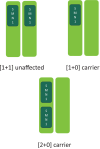Prenatal genetic counseling challenges with indeterminate SMA results
- PMID: 40176376
- PMCID: PMC11965976
- DOI: 10.1002/jgc4.2017
Prenatal genetic counseling challenges with indeterminate SMA results
Abstract
Spinal muscular atrophy (SMA) is an autosomal recessive neuromuscular condition with complex genetic etiology. About 95% of individuals affected with this condition have a homozygous deletion of the SMN1 gene. One scenario that complicates risk is when a parent is identified as a possible silent carrier, meaning they have a [2 + 0] chromosome configuration. This configuration occurs when an individual has two copies of the SMN1 gene on one chromosome and no copies on the other chromosome. It is thought that 3.8-4.0% of the general population is a [2 + 0] carrier with a higher prevalence in African American and Hispanic populations. The [2 + 0] configuration makes it more difficult to calculate residual risk because testing cannot determine the difference between [2 + 0] carriers and [1 + 1] non-carriers, leading to indeterminate SMA carrier screening results. SMA was added to general population carrier screening in 2017, leading to an increase in the number of patients identified to have indeterminate results. Previous research has not examined how this addition has affected counseling practices involving indeterminate results. The purpose of this research was to gain a better understanding of the practices and challenges in this area, specifically within non-Ashkenazi Jewish (AJ) populations. This study utilized a quantitative survey with open-response questions. Responses from 49 prenatal genetic counselors from the United States and Canada were analyzed and it was found that genetic counselors face similar challenges when counseling indeterminate SMA results across all regions. These include negative patient emotions and both patient and referring provider misunderstanding, as highlighted in the qualitative data. Three major categories emerged including (1) challenges with patients, (2) challenges with referring providers, and (3) the effects of the 2017 addition to general population carrier screening. This study highlights the need for provider education surrounding indeterminate SMA results, the development of a visual aid, and future research from the patient and referring provider perspective.
Keywords: SMA; genetic counseling; genetic counselors; indeterminate; prenatal; underrepresented populations.
© 2025 The Author(s). Journal of Genetic Counseling published by Wiley Periodicals LLC on behalf of National Society of Genetic Counselors.
Conflict of interest statement
Molly Spangenberg, Laura Godfrey Hendon, Dana H. Goodloe, Fallon Brewer, Guihua Zhai, and Alicia Gomes state no conflicts of interest to report.
Figures
References
-
- Burzynski, S. , Leonard, J. , Albrecht, J. P. , Doyle, L. E. , & Mills, R. (2024). Parental questions about sex chromosome aneuploidies regarding sex, gender, and sexual orientation as reported by genetic counselors in a prenatal setting. Journal of Genetic Counseling, 1–13. 10.1002/jgc4.1897 - DOI - PMC - PubMed
-
- Glessner, H. D. , VandenLangenberg, E. , Veach, P. M. , & LeRoy, B. S. (2012). Are genetic counselors and GLBT patients “on the same page”? An investigation of attitudes, practices, and genetic counseling experiences. Journal of Genetic Counseling, 21, 326–336. 10.1007/s10897-011-9403-8 - DOI - PubMed
-
- Gregg, A. R. , Aarabi, M. , Klugman, S. , Leach, N. T. , Bashford, M. T. , Goldwaser, T. , Chen, E. , Sparks, T. N. , Reddi, H. V. , Rajkovic, A. , Dungan, J. S. , & ACMG Professional Practice and Guidelines Committee . (2021). Screening for autosomal recessive and X‐linked conditions during pregnancy and preconception: a practice resource of the American College of Medical Genetics and Genomics (ACMG). Genetics in Medicine, 23(10), 1793–1806. Erratum in: Genet Med. 2021;23(10):2015. 10.1038/s41436-021-01300-z - DOI - PMC - PubMed
MeSH terms
LinkOut - more resources
Full Text Sources
Medical


